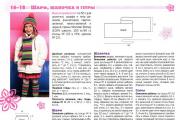How pregnant women can lose excess weight. Excess weight during pregnancy, what to do? Vitamins for pregnant women
Constant weight control is one of the key requirements of gynecologists for pregnant women. And the point here is not at all about aesthetics, but about the fact that extra pounds lead to the threat of miscarriage and complications during childbirth. To promptly stop a process dangerous to your health, find out how to quickly lose weight during pregnancy.
Normal weight gain during pregnancy
The permissible number of kilograms gained depends on the woman’s body constitution. With a normal physique, you need to gain from 10 to 12 kg during pregnancy. If a woman was prone to obesity before conceiving a child, her maximum weight gain is 8 kg. Pregnant women with initially low body weight are allowed to gain 12-15 kg. A woman expecting twins can gain 16-21 kg.
Light vegetable salads, boiled meat, and fresh fruit will help you lose weight during pregnancy.
Normally, weight gain occurs unevenly over 9 months. Monthly weight gain looks like this:
- 1st month – 0 kg;
- 2nd–3rd month – 0–1 kg;
- 4−5th month – 1−2 kg;
- 6−7th month - 2−3 kg;
- 8th month – 1−2 kg.
In the ninth month, as a rule, there is a decrease in weight by 1-2 kg.
When determining how to lose weight during pregnancy, you need to consider where the extra pounds come from. The most common reason is overeating. Sometimes an increased appetite develops due to stress, but more often a pregnant woman mistakenly thinks that in her position she has to eat for two. Other causes of excess weight: polyhydramnios, fluid retention, large baby.
How to lose excess weight during pregnancy?
In normal conditions, women lose weight thanks to diets, therapeutic fasting, and increased physical activity. However, pregnant women should not resort to such radical measures, because they will harm the baby. The only way for them to lose weight is to establish a healthy diet. The daily diet should be divided into 5-6 meals, and very high-calorie, fatty foods should be excluded from the diet.
To lose excess weight during pregnancy, do apple fasting days once a week.
Important! For edema, it is often recommended to reduce water consumption to 1 liter, but the best way to get rid of fluid stagnation in tissues is to give up salt
We live in an era of struggle with excess weight. On the one hand, products in supermarkets and dishes in cafes for the most part contribute to the gain of additional kilograms, on the other hand, slimness and health are now in fashion. Healthy food stores are confidently gaining more and more popularity: humanity has come to the conclusion that it is imperative to monitor your weight and health.
In developed countries, excess weight is considered a sign of trouble: rich people can afford to eat healthy and healthy and go to the gym. This culture is just coming to us, as well as the understanding that even the period of pregnancy does not give any concessions in this matter: the expectant mother should under no circumstances eat for two.
Meanwhile, extra pounds accumulate not only due to overeating. This could be poor nutrition, hormonal imbalances, physical inactivity, and much more. And in the fight against obesity, this should always be taken into account.
What weight is considered overweight during pregnancy?
It is necessary to monitor weight gain starting from the very first days of pregnancy. Actually, this is what doctors do: from the moment a woman is registered, her weight will be recorded every time she visits a gynecologist, but this is not enough. It is necessary to control increases at home as well.
Of course, no woman would like to gain weight while carrying a baby: it is ugly and deals a big blow to our psyche and self-esteem. Moreover, the greater the increase, the more difficult it is to return to your previous prenatal shape after pregnancy.
However, the biggest danger lies elsewhere. Excess weight during pregnancy promises many problems and troubles for the expectant mother and her baby. The list of possible complications is quite large: impaired blood circulation and uteroplacental metabolism, the formation of edema, high blood pressure, gestosis, varicose veins, development of a large fetus, ruptures during childbirth and injuries to the child, and others.
No matter how much we want it, but normally a woman carrying a pregnancy inevitably gains several kilograms. The physiological increase is formed by the increased volume of blood circulating in the body, the formation of the placenta, umbilical cord, amniotic fluid and amniotic fluid, the growing uterus and mammary glands, and the baby. 2-3 kilograms are also fat: it is now vital (for nutrition and mechanical protection of the baby). Over the entire period of gestation, a woman “has the right” to gain an average of about 8-12 additional kilograms, compared to her pre-pregnancy weight. But this figure is very arbitrary. If you are underweight before conception, it may increase; if you are overweight, it may decrease.
How can you lose weight during pregnancy?
Ideally, of course, you need to constantly monitor your weight and always adhere to the recommendations outlined in this article. But, firstly, even without overeating during pregnancy, it is very easy to gain excess weight; secondly, regardless of the reasons, the problem must be solved.
How to lose weight during pregnancy is a very delicate question.
A woman carrying a pregnancy should under no circumstances go hungry or not eat enough. The supply of nutrients is now extremely necessary for both her and the unborn baby. It should be a balanced and fairly varied diet. It should be based on complex carbohydrates and whole grains (cereals made from unpolished grains, unsweetened baked goods made from whole grain flour, pasta and spaghetti from durum wheat). Every day, the expectant mother's menu includes lean protein: boiled meat (preferably beef, turkey), liver, cottage cheese, eggs (preferably without yolk), fish.
Choose vegetables and fruits that are high in fiber and have a low glycemic index, that is, non-starchy. Potatoes, beans and other legumes should be limited.
Fats are also very important, but in limited quantities. It should be nuts, cheese, sour cream, vegetable oils without heat treatment. Butter is acceptable in small quantities.
Fried foods should be excluded from the diet, and if there are no problems with excess weight, then simply reduce their quantity. Also, if you are obese, you should avoid products made from white flour and sugar-containing foods and drinks, canned food, marinades, pickles, smoked products, fast food, semi-finished products and other prepared foods.
Salty treats are not recommended for pregnant women in principle: salt retains fluid in the body, forming edema, increasing the risk of complications and, among other things, influencing the scales upward. But you definitely need to drink water - simple purified water, in sufficient quantities.
By slightly adjusting your eating habits, you can already begin to lose a little weight, even without limiting the calorie content of your diet. But when it comes to excess weight during pregnancy, quantity becomes no less important than quality.

How to lose weight during pregnancy without harm?
You should be concerned about excess body weight during pregnancy if you gain more than 1 kilogram per week after 16 weeks. First of all, you should exclude fluid retention in the body and, if necessary, start taking diuretics - only a doctor can decide this.
No matter how significant the increase, you should never go on a diet during pregnancy unless your doctor recommends it. This will mainly harm the developing fetus: scientists have found that when there is a deficiency of nutrients during pregnancy, the mother’s body is the first to be “saved,” and in this case the fetus gets nothing (previously it was believed that the baby mainly takes everything necessary for itself). If there is a lack of nutrition, the child simply will not be able to develop normally.
Regarding fasting days for pregnant women, they can be used, but you should know that not all doctors approve of this practice. Therefore, before choosing any unloading option for yourself (and there are many of them) and putting it into practice, be sure to discuss all the details with the gynecologist leading the pregnancy.
If your excess weight is small or you are not sure that unloading for weight loss will not cause you and your baby any harm, then follow the recommendations that will certainly help you get rid of excess weight and improve your health:
- Eliminate from your diet all those harmful foods that we have already discussed above.
- Eat small meals: often, but in small portions, having one snack between breakfast, lunch and dinner. The break between meals should be on average 2-2.5 hours, but no more than 4 hours. The snack should be nutritious, but modest: for example, a small handful of nuts and an apple or 3-4 dried fruits.
- Cook without using fat. Add vegetable oil one or two spoons at a time to the finished dish.
- Remove skin and fat from meat before cooking.
- Count your calories. The daily caloric intake of an overweight pregnant woman should not exceed 2200-2400 kcal, but it is also impossible to reduce nutritional value without medical indications.
- Drink water. Never limit your water intake on your own. Every day you should drink at least 1.5 liters of purified, unboiled water, preferably between meals and no more than 100 g at a time.
- Try to consume carbohydrates in the first half of the day, and for dinner, cook lean meat and vegetables, you can drink kefir or eat low-fat cottage cheese.
In addition, it is very good if, even before pregnancy, you were involved in sports or physical exercise and continue to do so now. Otherwise, sign up for pregnancy classes, making sure you check with your doctor that you have no contraindications. You can choose fitness, swimming, aerobics or simple gymnastics.
If you can’t exercise, then be sure to take leisurely walks every day! But at the same time, do not forget about proper sleep and rest: even overweight pregnant women benefit from short naps during the day (by the way, it has been proven that it also burns some calories).

Features of nutrition during pregnancy
In an effort to maintain or lose weight during pregnancy, you should never ignore some nuances. A pregnant woman’s body now functions in a special mode. At different times, he experiences an increased need for certain substances, and therefore cannot be limited. So, in the first trimester, when the formation and formation of all organs and systems of the baby occurs, protein plays a very important role. The expectant mother should consume at least 1.5 g of protein per kilogram of her body weight every day.
Make sure your diet contains sufficient amounts of zinc, magnesium, selenium, iodine, copper, cobalt, folic acid, and vitamins B and C.
Food “perversions” are observed in expectant mothers at the beginning of pregnancy for a reason, too, and therefore if you feel the need for salty or sour, then satisfy it, but just don’t get carried away.
As for the nutritional value of food, the calorie content of the daily diet during pregnancy increases with term. In the first trimester, you can stick to your usual caloric intake (it depends on the woman’s initial weight and her physical activity, but on average it is 1500-1800 kcal). From the second trimester, the need for calories increases, which means you need to eat approximately 200-300 calories more every day, but not more than 2200 kcal per day. In the third trimester, daily caloric intake can reach up to 2400 kcal.
At the same time, the rule of healthy eating remains relevant throughout the entire period: it is necessary to increase the calorie content of the diet only through healthy foods. If you are overweight, fats and simple carbohydrates are limited first. B vitamins help maintain normal weight: when they are deficient, women often crave starchy foods and sweets.
With the onset of the second trimester, protein intake should be slightly increased (up to 2 grams per kilogram of weight). All the vitamins and microelements mentioned are just as important, but now you will have to add extra pressure to iron, calcium, phosphorus, vitamins A and D. In the later stages, complex carbohydrates and coarse fiber play a leading role. Bran and brown rice are very useful. It is almost impossible to get the required amount of nutrients from food, nutritionists and doctors say. Therefore, additional intake of biological supplements is recommended.
Finally, we note that you should not pay excessive attention to your weight now. It is important to objectively assess how well it fits into acceptable standards. There is still a period of breastfeeding ahead of you: you will have to make adjustments to the menu again, but it should remain healthy, nutritious and balanced. This will help you get back into shape faster and easier, and in general will be very beneficial for your health.
Especially for - Larisa Nezabudkina
It used to be that a woman expecting a child had to eat for two. Nowadays, gynecologists recommend that expectant mothers be careful about their diet and lifestyle. In order for the baby to be born healthy, and for the woman not to lose her attractiveness after pregnancy, she must know how to lose weight during this difficult period.
Excess weight and pregnancy
During the entire period of waiting for a child, an increase in body weight of 12 kg is considered normal. When a woman gains much more, she begins to think about how to lose weight during pregnancy without harming the fetus. Weight consists of amniotic fluid, baby weight, placenta, additional blood volume and enlarging breasts. The fat layer also increases, which is associated with maintaining hormonal balance in the female body.
For this reason, pregnancy and excess weight are very vague concepts. However, if a woman gains it rapidly, this contributes to the development of complications such as varicose veins, heart pathologies, and gestosis. The most common consequence of extra pounds is swelling, which indicates poor kidney function. It is important for an expectant mother to be able to control her weight in order to avoid unpleasant consequences.
Is it possible to lose weight during pregnancy?
Gynecologists say that only those women whose kilograms threaten to cause complications for her health or the development of the baby should think about how to lose weight during pregnancy. You should remove excess weight during pregnancy if severe obesity poses a danger:
- spontaneous expulsion of the embryo;
- increased blood loss during childbirth;
- premature birth;
- heavy rehabilitation.
How to lose weight while pregnant without harming the baby
To lose extra pounds without harming your baby, you should review your diet and perform special exercises for expectant mothers every day. Losing weight during pregnancy will happen faster with an active lifestyle. To do this you need:
- regularly engage in stretching, stretching, and gymnastics;
- swim in the pool;
- go for a massage;
- breathe correctly when walking;
- walk more often in the fresh air.
Diet for pregnant women for weight loss
Proper childbearing requires a review of nutrition. Expectant mothers should not lose weight through a strict diet. However, to prevent nutritional obesity from becoming a cause of complications, you need to know some nuances:
- a diet for losing weight during pregnancy should contain 10% more protein;
- you should give up fast carbohydrates (sugar, sweets);
- most of the diet should consist of cereals, vegetables, cereals, legumes and hard fruits;
- Excessive consumption of freshly squeezed fruit juices should be avoided;
- it is necessary to reduce the time for heat treatment of food;
- To lose weight, you need to eat heavy food before 15:00.
Exercises for weight loss during pregnancy
In addition to adjusting your diet, how else can you lose weight during pregnancy? Physical activity, which includes a complex of breathing techniques and muscle stretching. Particular attention should be paid to the muscles of the pelvis, perineum, and vagina. Exercise not only helps you lose weight, but also prepares the expectant mother for labor and normalizes the functioning of the heart and vascular system. Before doing any exercises to lose weight during pregnancy, you should definitely consult your gynecologist.

How to lose weight during pregnancy
Excess body weight in a pregnant woman usually begins in the second trimester. How to lose weight during pregnancy is decided by the doctor in each individual case. However, there are general recommendations for weight loss:
- you need to eliminate fluid retention (do not eat salt, drink more water);
- take additional vitamins and minerals;
- reduce consumption of unhealthy fats, flour products, sweet pastries;
- peel meat before cooking;
- eat small meals;
- count calories (2400 kcal/day).
Losing weight in the first trimester of pregnancy
Losing excess weight in the first months is much easier than in subsequent months. How to lose weight during pregnancy if a woman has already gained a lot of weight in the first trimester? The only thing you need is to follow the rules of rational nutrition. Avoiding overly spicy and highly salty foods, which retain water in the body, helps you lose weight in the first trimester of pregnancy.
How to lose weight during pregnancy in the 2nd trimester
If after 14 weeks you begin to gain weight rapidly, then you should take your menu seriously. Weight loss for pregnant women during this period includes one fasting day per week, which is preferably carried out on fermented milk products. You should be careful with chocolate and coffee, as these treats do not allow the calcium necessary for the intrauterine development of the child to be fully absorbed. Eat less foods containing cholesterol: butter, chicken yolks, lard, rich desserts. It is better to replace them with fruits: apples, oranges, pomegranates.
Often, expectant mothers face the problem of gaining excess weight during pregnancy. From our material you will learn what dangers await overweight women, and how to lose weight during pregnancy without harming the baby.
You will find tips and tricks for safe weight loss and healthy eating during all trimesters. You will also learn what sports are recommended to engage in while expecting a child. The video exercises that supplement the article will help you keep your body in good shape.
Pregnancy is the best time to improve your health and change your lifestyle. So why not start by creating healthy eating habits? This will help you avoid gaining extra pounds in 9 months and, if necessary, lose weight. In the future, it will be easier for you to get in shape after the birth of your baby.
Losing weight during pregnancy is necessary only for those women who gain a lot of weight, and, according to the gynecologist, this can cause complications during pregnancy or the postpartum period.
When to lose weight?
If you doubt whether you can lose weight during pregnancy, you should consult your doctor. Based on your starting weight and your weight gain, he will determine whether you should take action to lose weight.
Before prescribing a diet for pregnant women, the doctor must check the tests and send you for an ultrasound to make sure that the baby is developing normally and that your weight loss will not negatively affect his health.
Remember that 10-12 kg. - this is the norm for weight gain for a pregnant woman, but if you previously weighed less than you should, then the norm for you will be an increase of 15-18 kg. If a woman did not have a refined figure even before her “interesting position,” then the maximum permissible weight she can gain is 10 kg. At various stages of obesity, weight gain should not exceed 5-6 kg.
The dangers of being overweight
- expectant mothers have an increased risk of developing heart disease;
- a large increase can also cause the development of diseases of the nervous system;
- in most cases, overweight women begin to develop varicose veins;
- excess weight during pregnancy has a detrimental effect on the condition and functioning of the endocrine system;
- With serious weight gain, the load on the musculoskeletal system increases significantly.
Severe obesity can cause complications during or after childbirth.
Consequences
- threat of miscarriage;
- increased blood loss or urinary tract infections during labor;
- premature birth;
- intrauterine growth retardation;
- difficult rehabilitation after childbirth.
How to lose weight without harming your child
- To ensure that the process of losing weight does not have a detrimental effect on the development of the child, you need to increase the amount of protein consumed by 10%.
- Avoid fast carbohydrates. If it’s difficult for you, you can eat sweets in the morning.
- Most of your diet should consist of slow (or as they are also called - complex) carbohydrates. Moreover, in addition to cereals and cereals, these also include hard fruits, vegetables, and legumes. Let's talk separately about potatoes. Although this product is considered safe, a woman who is advised to lose weight should reduce the amount in her diet. But pasta made from durum wheat is not only possible, but also should be consumed during pregnancy.
- Avoid excessive consumption of fruit juices. The fructose they contain can contribute to excess weight gain.
- Try to reduce the time it takes to cook food. For example, bake vegetables for salads in their peels, and bake meat or fish in a sleeve or foil. An additional benefit of this solution is that you will reduce the amount of fat used to prepare everyday dishes. And this will help you lose weight.
Forming proper eating habits
- Train yourself to eat heavy foods in the first half of the day, and in the evenings enjoy lactic acid products, light vegetable salads, and cottage cheese.
- Under no circumstances follow the rule - you cannot eat after six in the evening. The last time you eat food is 3-4 hours before bedtime. The baby's body adapts to the biorhythm of the pregnant mother and also prepares for bed.
- If you really want to eat before going to bed, then it is better to give preference to food that creates a feeling of fullness (bran, nuts) - when they get into the stomach, they swell, and the expectant mother gets full faster.
- To lose weight during pregnancy, chew your food thoroughly. This way, satiety from a meal comes faster, and the chances of overeating are minimized.
Prohibitions
Every expectant mother concerned about how to lose excess weight during pregnancy is prohibited from:
- Go on strict diets and starve yourself(the mother needs to receive vitamins and microelements that will ensure the proper development of the fetus). In addition, hunger strikes lead to stress, which does not have the best effect on the child.
- Use teas, dietary supplements and other drugs for weight loss. Teas contain complexes of various herbs that can increase the tone of the uterus or even cause abortion. Dietary supplements, in turn, contain substances that block the feeling of hunger and reduce appetite. And this is completely unacceptable for an expectant mother!
- Actively play sports(perform a set of strength exercises or pump up your abs). But this doesn't mean you just need to lie on the couch. After receiving the approval of your doctor, you can play sports without fear. This is a great way to lose a few extra pounds.
Losing weight should not become your goal in itself. While expecting a baby, you should first of all worry about his health!
How to lose weight?
First trimester
At the beginning of pregnancy, many women find it difficult to gain excess weight (primarily due to toxicosis in the early stages). So all you need during this period is to follow the rules of healthy eating. It is also recommended to eat 3-4 times a day. This will help in the early stages not to stretch your stomach.
Eating overly salted and overly spicy food can cause a protracted and severe form of toxicosis!
Second trimester
Starting from the second trimester of pregnancy, nutrition must be taken very seriously. And if you start gaining more than 1 kg per week (from about 16-20 weeks), then most likely the doctor will recommend that you have a fasting day once a week. To prevent weight gain too quickly, it is recommended to follow some rules:
- It is recommended to eat 5-6 times, but in small portions.
- Drink coffee and chocolate little by little and no more than once a week. These treats impair calcium absorption. If you really like sweets, then you can eat marmalade and halva in small quantities.
- Dried fruits should be treated very carefully in the second trimester, because 1-2 hours after eating them you may have an irresistible urge to snack.
- You need to give up wheat bread and give preference to rye or black bread. If you bake bread at home, you can cook it with oatmeal.
- Reduce your intake of onions and garlic in your diet. Be careful with spices.
- Partially or completely give up sugar and confectionery products. The same applies to grapes. In addition to the fact that these products contribute to weight gain, they cause fermentation.
- Try to eat less foods high in cholesterol (chicken yolks, sausages, lard, butter and sour cream with a high percentage of fat). Pastries are also rich in cholesterol.
Third trimester
- During this period, you need to eat even more often (up to 6-7 times a day). It is worth adhering to the fractional nutrition scheme.
- Not only for weight loss, but also for the well-being and proper development of the baby, it is advisable to adhere to a mostly vegetarian diet. The fact is that vegetables, fruits and grains will help normalize stool. And problems with bowel movements very often arise just in the final stages of pregnancy. Meat is allowed, but in much smaller quantities.
- 3-4 weeks before giving birth, you should reduce your intake of lactic acid products. An excess of calcium in the body leads to the deposition of its salts in the baby’s skull, which can cause abnormalities at birth. In addition, these measures will help you avoid gaining extra pounds.
- It is forbidden to consume strong meat and mushroom broths. They contain extractive substances that pose a great danger to pregnant women with stomach diseases.
- As you approach your due date, you need to reduce the amount of fluid you drink.
- It is also advisable to cook dishes without salt (or with a minimum amount of it).
- As throughout pregnancy, drinking alcoholic beverages is strictly prohibited.
- Avoid foods with yeast (bread, kvass). These products provoke the development of candidiasis colpitis.
Sports for weight loss
If you feel well and there are no contraindications, it is recommended to exercise at home or attend pregnancy groups in the gym.
- Training should take place at a measured pace.
- When doing exercises, listen to yourself and how you feel.
- Sports such as yoga and Pilates are best.
- Swimming and water aerobics are very useful during pregnancy.
- During these nine months, special attention should be paid to stretching and exercises to relax the back.
- It is also recommended to perform Kegel exercises, simple gymnastics for pregnant women and exercise with a fitball.
- Try to walk in the fresh air as much as possible (walk 2-5 km daily). This will help you lose excess weight. In addition, walking during pregnancy will help the baby avoid oxygen starvation.
What exercises should you avoid?
- complexes with active jumps, swings of legs and arms;
- intense training;
- sports in which there is a risk of falling (skating, rollerblading, cycling);
- in the 3rd trimester, avoid exercises in a lying position (at this stage the uterus puts a lot of pressure on the internal organs).
Scientists have proven that reasonable physical activity helps not only to lose weight, but also to carry and give birth to a child without complications.
Fitball exercises: video
Fitness from a physiotherapist: video
If you have any pathologies, sports are contraindicated. It is permissible to perform physical exercises only after the permission of the attending physician.
Now you know that losing weight during pregnancy is still possible. But this can only be done in exceptional cases. Do not under any circumstances try to lose weight if you do not gain more weight than normal. You also shouldn’t try to lose weight on your own without a doctor’s advice. All you need is to adhere to a healthy lifestyle, do healthy exercises and eat right.














